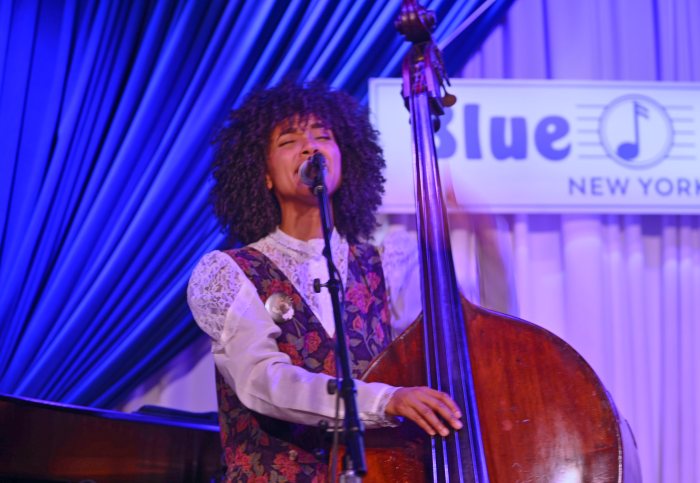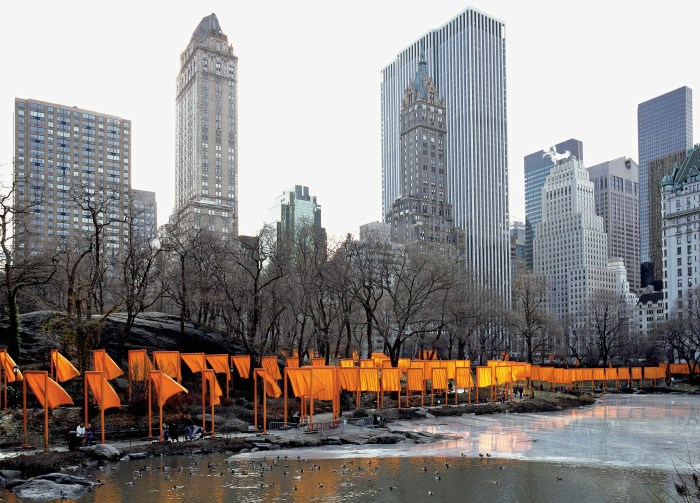As the wider Internet celebrated “Back to the Future” day on Oct. 21, the day into which Marty McFly leaps in the second installment of the film series, the indie electro-pop outfit YACHT quietly and slyly put forward its own vision of times to come.
With shots of lead singer Claire L. Evans swiping left on a Tinder-like app called “Misogynista” and being led around on a leash by a drone, the music video for the newest single from the self-labeled “band, belief system and business,” “I Thought the Future Would Be Cooler,” is a long way from faux-complaining about a lack of hoverboards.
The timing, Evans said, “was serendipity, which we then said, ‘let’s double down on this.’ The result of the juxtaposition of our video’s vision and what the rest of the Internet was talking about that day was a satisfying disconnect for us.”
amNewYork caught up with Evans, who also edits science-fiction stories for VICE’s “Motherboard” site, to chat about the future, hoverboards or no, in advance of the band’s concert at Rough Trade NYC.
Why has the future traditionally been such a fertile ground for artists’ imaginations?
The future is a blank slate, by definition, and nobody can lay claim to it. It allows speculation of equal validity from all various sorts of people. It’s one of the few things in this world that we all have equally — no one owns the future. People may own the present, but the future is always two steps ahead of us. On our last album, we were very interested in the idea of utopia, which has a similar quality. It’s something that can never be possessed and is very much defined by the aspirations of the artist who imagines it. And the future is a kind of extension to that.
Is that idea made more alluring today because of how tough it is for artists to own physical spaces in places like Manhattan or your hometown of Los Angeles?
I think owning physical space in the 21st century, like real estate, is tricky. And even though we have this wide open communal space of the web, it’s still very siloed and corporate. It’s just as difficult to have your voice heard online as it is in the real world, if not more so because of the sheer volume of discourse happening. We always say that you can spend as much time as you want on a piece of art, and it can mean everything to you, and then you put it out into the world and it enters into an undifferentiated stream of content, a word people are using with less and less irony. You compete equally with everything in the world. As an indie artist, you compete with pop stars, with cat videos, with global warfare, with viral videos of turtles humping a sandal. There’s no real space for artists. The future — at least we have that.
What’s been the biggest misconception about the future in science fiction?
I think we’ve been tending towards the dystopian for a long time, to the point where having a utopian idea of the future, or even just a vaguely positive view, maybe slightly naïve. [The] “maybe it’ll be better tomorrow” vision is so rare. And when it does surface, it feels so out of touch. And I think that’s a shame, because there’s only so much you can do with dystopia. It’s just as unrealistic to me as a Mickey Mouse “Tomorrowland.”
Give me a reason to be optimistic about the future.
Even when the world is a total garbage pile, we can still connect with people in a really profound way. We’re part of something that we created. And that seems to exist to this day, regardless of what’s going on outside the doors of a rock club. There’s still real beauty and compassion in microscenes. … Sometimes I see our fans, and they’re just miraculous to me. People who make an effort to seek out things, to dive into them and find meaning in them. That’s what keeps me going: Knowing that there are people who will still dive deep.
If you go: YACHT performs on Nov. 5 at 8 p.m. at Rough Trade NYC, 64 N. Ninth St., Williamsburg, 718-388-4111, sold out.





































